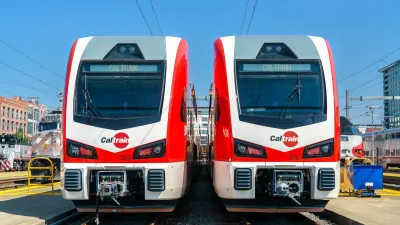What they may lack in peace and quiet, crowded cities more than make up for by requiring residents to live smaller. Tangible environmental benefits follow.

Backed up by research from the OECD, Emily Badger writes about a paradox of density. Long viewed as a blight by conservationists, the dense city actually reduces per capita emissions by making wasteful lifestyles less attractive. Smaller homes and increased reliance on public transit over automobiles make the greatest difference here.
This trend might lead to wider environmental benefits: two families living in an apartment building likely consume less energy than two families in detached houses outside the city. And the more people who pack into cities, the more land we can conserve outside of them.
The article includes a graphic from the OECD plotting per capita transport emissions against urban population density for selected major cities. An interesting takeaway is just how drastically New York City diverges from the rest of the nation in those metrics.
FULL STORY: The impressive environmental bonus of crowded city living

Maui's Vacation Rental Debate Turns Ugly
Verbal attacks, misinformation campaigns and fistfights plague a high-stakes debate to convert thousands of vacation rentals into long-term housing.

Planetizen Federal Action Tracker
A weekly monitor of how Trump’s orders and actions are impacting planners and planning in America.

San Francisco Suspends Traffic Calming Amidst Record Deaths
Citing “a challenging fiscal landscape,” the city will cease the program on the heels of 42 traffic deaths, including 24 pedestrians.

Adaptive Reuse Will Create Housing in a Suburban Texas Strip Mall
A developer is reimagining a strip mall property as a mixed-use complex with housing and retail.

Study: Anti-Homelessness Laws Don’t Work
Research shows that punitive measures that criminalized unhoused people don’t help reduce homelessness.

In U.S., Urban Gondolas Face Uphill Battle
Cities in Latin America and Europe have embraced aerial transitways — AKA gondolas — as sustainable, convenient urban transport, especially in tricky geographies. American cities have yet to catch up.
Urban Design for Planners 1: Software Tools
This six-course series explores essential urban design concepts using open source software and equips planners with the tools they need to participate fully in the urban design process.
Planning for Universal Design
Learn the tools for implementing Universal Design in planning regulations.
Heyer Gruel & Associates PA
JM Goldson LLC
Custer County Colorado
City of Camden Redevelopment Agency
City of Astoria
Transportation Research & Education Center (TREC) at Portland State University
Jefferson Parish Government
Camden Redevelopment Agency
City of Claremont





























